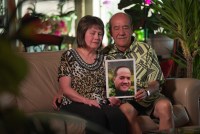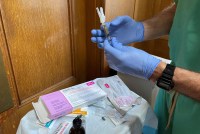Latest Morning Briefing Stories
As money flows to abortion rights initiatives in states, some donors focus on where anger over the “Dobbs” ruling could propel voter turnout and spur Democratic victories up and down the ballot, including in key Senate races and the White House.
As More States Target Disavowed ‘Excited Delirium’ Diagnosis, Police Groups Push Back
After California passed the first law in the nation to limit the disavowed term “excited delirium,” bills in other states are being introduced to help end use of the diagnosis. But momentum is being met with resistance from law enforcement and first responder groups, who cite free speech.
Secret Contract Aims to Upend Landmark California Prison Litigation
California has commissioned an exhaustive study of whether its prisons provide a constitutional level of mental health care, which it could use to try to end one of the lawsuits that have federal courts overseeing the state’s prisons. But corrections officials won’t disclose even basic details of the consultants’ contract, including its cost to taxpayers.
A New $16,000 Postpartum Depression Drug Is Here. How Will Insurers Handle It?
A pill form of an effective drug for postpartum depression hit the market in December, but most insurers do not yet have a policy on when or whether they will pay for it. The hurdles to obtain its predecessor medication have advocates worried.
California Voters Are Skeptical That More Money Is the Answer to Homelessness
California Gov. Gavin Newsom’s signature ballot measure to address mental illness, addiction, and homelessness with a $6.4 billion bond and other reforms, is barely ahead in the ongoing ballot count. The slim margin reflects a growing unease among Californians over the governor’s homelessness initiatives.
California Attorney General Boosts Bill Banning Medical Debt From Credit Reports
California Attorney General Rob Bonta has thrown his weight behind state Sen. Monique Limón’s legislation to bar unpaid medical bills from showing up on consumer credit reports. If passed, California would join just a few other states with such protections.
En 2022, el año más reciente del que se dispone de datos, 7,385 californianos murieron por sobredosis relacionadas con opioides, de los cuales el 88% involucró fentanilo, un opioide sintético que puede ser 50 veces más potente que la heroína.
Newsom’s $6.4 Billion Homelessness Gambit Hangs by a Thread
California Gov. Gavin Newsom’s ambitious attempt to combat the mental health and addiction epidemic in his state is leading by a razor-thin margin, calling into question whether voters trust him to confront the state’s growing homelessness crisis. Newsom asked voters on Tuesday to approve his $6.4 billion bond measure, dubbed “Treatment not Tents” — the […]
California May Face More Than $40M in Fines for Lapses in Prison Suicide Prevention
A court expert reported that California prisons continue to lag on 14 of 15 suicide prevention measures, and even regressed in some areas. The state could face more than $40 million in fines after a federal judge warned more than a year ago that she would impose penalties for each violation.
Biden Team, UnitedHealth Struggle to Restore Paralyzed Billing Systems After Cyberattack
The cyberattack on a unit of UnitedHealth Group’s Optum division is the worst on the health care industry in U.S. history, hospitals say. Providers struggling to get paid for care say the response by the insurer and the Biden administration has been inadequate.
When It Comes to Ketamine, Meta’s Posting Policy Is No Party to Decipher
Despite growing awareness that the party drug is dangerous, the social media company is open to promotion of the drug in treating mental health.
Why Even Public Health Experts Have Limited Insight Into Stopping Gun Violence in America
After the 1996 Dickey Amendment halted federal spending on research into firearms risks, a small group of academics pressed on, with little money or political support, to document the nation’s growing gun violence problem and start to understand what can be done to curb the public health crisis.
Biden’s Got a Taker for One of His Gun Safety Proposals: California
California could give President Biden a political win this year on gun violence. State senators passed sweeping legislation in January that would toughen gun storage requirements, embracing a White House priority that has languished in Congress. Many states, including California, have laws in place requiring gun owners to securely store their firearms when children are […]
California Pushes to Expand the Universe of Abortion Care Providers
A new California law allows trained physician assistants, also called physician associates, to perform first-trimester abortions without the presence of a supervising doctor. The legislation is part of a broader effort by the state to expand access to abortion care, especially in rural areas. Some doctor groups are wary.
California Hospitals, Advocates Seek Stable Funding to Retain Behavioral Health Navigators
California has supported expanded use of medications in the fight against opioid use disorder and overdose deaths. But hospitals and addiction treatment advocates say the state needs to secure ongoing funding if it wants more behavioral health workers to guide patients into long-term treatment.
California Takes Up White House Call to Toughen Gun Storage Rules
State lawmakers are weighing legislation that would require gun owners to keep their firearms locked up most of the time, a move advocated by the Biden administration.
Toxic Gas That Sterilizes Medical Devices Prompts Safety Rule Update
The Environmental Protection Agency is tightening regulation of ethylene oxide, a carcinogenic gas used to sterilize medical devices. The agency is trying to balance the interests of the health care industry supply chain with those of communities where the gas creates airborne health risks.
The Supreme Court Confronts a Public Health Challenge: Homeless Encampments
Homelessness is a soaring public health crisis, with a record 653,000 unhoused people in the United States, according to federal estimates. Tent and recreational vehicle encampments have exploded in recent years, crowding streets and sidewalks from Portland, Ore., to New York. In California, where roughly a third of all the nation’s homeless people live, doctors […]
California Lawsuit Spotlights Broad Legal Attack on Anti-Bias Training in Health Care
State laws requiring doctor training on how bias affects treatment violate teachers’ right to free speech, opponents say.
California Gov. Newsom Wants Voters to Approve Billions More to Help the Homeless. Will It Help?
A March 5 ballot initiative seeks $6.4 billion to build thousands of new housing units and provide mental health treatment for homeless people — on top of the billions already being spent to address the public health crisis. Despite significant support from health and law enforcement officials, many front-line workers are skeptical that more money is the answer.























